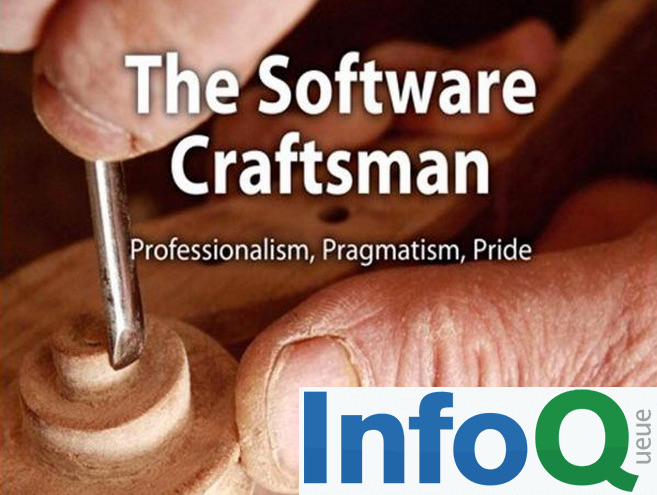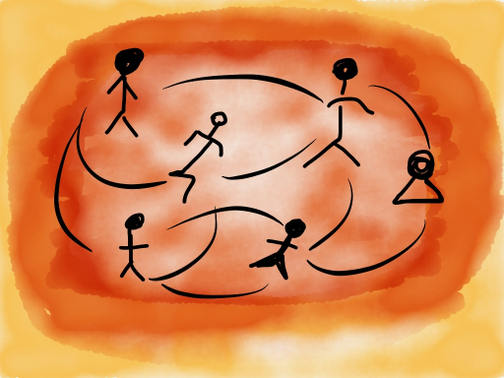
- By Sandro Mancuso
- ·
- Posted 06 May 2015
Today, talking about doing a big design up-front (BDUF) sounds a bit ridiculous, right? Who would do that? That's not craftsmanship, is it?
However, in the past, that would be considered the norm. Writing requirement documents, drawing architectural and very low level detail diagrams was the right thing to do. Well, that’s what very smart guys proposed on the 1968 NATO Software Engineering Conference and it worked for NASA and the US Department of Defense. I’m sure they know what they are doing and if it works for them, it will definitely work for our small CRUD application or one page website. And then it happened. It became a religion and the majority of projects in the following decades were developed like that.
No, but not nowadays. We've learned the lesson, right? We wouldn't make this mistake again.
After watching a few talks in conferences and InfoQ, we understood that this is not a good thing. We’ve also read in some books that we should do TDD. The design should emerge from tests.
And of course, we should adopt an Agile methodology as well. Let’s adopt Scrum to start with. There are many books about it, certifications and even entire conferences dedicated to it. Of course we should adopt TDD an Scrum because that’s the best approach to manage and develop and software.
Oh, but what about all this lean stuff? Eliminate waste, limit work in progress, system thinking, theory of constrains, Kanban. I heard it worked really well for Toyota so we should definitely do that as well. Why? Jesus, you just don’t get it. Of course that’s best approach to manage and develop software.
God, how could I forget? I was also told that I really should speak to my customer. We should really discuss the requirements so we can have a better understanding of what we should build. Are you using BDD? No!!! Wow! How can you develop software without that? Why should you use it? The answer is simple. That’s the best approach to manage and develop software. Don’t tell me that you thought that BDD was a testing tool. You are so yesterday. That was version one. BDD version three is all about communication. It's about software development done right. Yes, I know it sounds alien but apparently we are supposed to speak to people. God, how on Earth we haven’t thought about that before? How did we develop software all these years? If you don’t use BDD, you are just doing it wrong. Why? Because that’s the best approach to manage and develop software. Duh!
Outside-In TDD, Inside-Out TDD, ATDD, Classic TDD, London School TDD? Really? Are you still discussing that? Don’t tell me that we you are still writing tests. What? Why are you wasting time writing unit tests? It doesn’t make sense any more. You should spike and stabilize. What if you don’t know what you are doing or where you are going? What if you just want to explore your options? Why are you writing tests? Oh, I get it. You were told that this was the best approach to manage and develop software. Nah, forget that. Unit tests are for losers. We write small services and just monitor them. If they are wrong, we just throw them away and re-write. And THAT is the best way to manage and develop software.
Architecture and design patterns? What??? Who are you? My grandfather? Scrap that. That’s for programmers from the 80ies and 90ies. In the real world we have our design emerging from tests. No, stupid. Not using normal TDD. God, which planet do you live? We use TDD As If You Meant It. We use this technique and PRESTO, the design emerges and evolves nicely throughout the life span of the project regardless of how many developers, teams and design skills. Every one can see code smells, right?
And what about DDD? Domain Driven what? Nah, never heard about it. Hmm.. hold on. I think I heard something about it many years ago, but probably it was not important enough otherwise we would have more people today saying that DDD is the best approach to manage and develop software.
Noooo. No no no no. No, I didn't hear that. Get out of here. Did you just say that you are still using an Object-Oriented language? STATICALLY-TYPED???? No, sorry. This conversation is a waste of my time. It's because of people like you that our industry is shit. The only way for this conversation to get even worse is if you tell me that you still use a relational database. Haven't you heard that functional programming is a MUST DO and just retards and programmers from the 80ies and 90ies use relational databases. Functional languages, NoSQL databases... Repeat with me. Functional languages, NoSQL databases. What a douche bag.
Ah, trying to be a smart ass? Yeah, functional programming appeared long ago in the 50ies and developers in the 60ies and 70ies preferred to use OO instead. But you don't know why, do you? DO YOU? They did use OO because they were a bunch of hippies that didn't take anything seriously. They were that sort of people that went to Woodstock, got high on LSD and had brain damage after that. No, don't take this whole OO stuff seriously. We are finally getting back to reality now. Functional programming and NoSQL databases are definitely the best approach for software development.
Before I conclude, I just want to clarify that by no means I'm criticizing any person or group of people behind some of the methodologies, technologies or techniques mentioned above. These people have done an amazing job thinking, practicing and sharing their own ideas of how software development could be done in a better way and for that we should all be grateful. Our industry if definitely better with their contribution.
My main criticism here is about how the vast majority of developers react to all these things. It is not just because someone, somewhere wrote a book, recorded a video or gave a talk in a conference about something that it will make that thing right, in all contexts. Quite often, we fail to question things just because the people promoting it are relatively well known. We fail to understand the context where a methodology, technology or technique should be best suitable for. We fail, quite often, to use our own judgement because of the fear to be ridiculed by our colleagues. We should stop being dogmatic and religious about things. This just leads to stupid decisions. Doing things for the sake of doing or because someone else said so is just plain wrong and stupid.
Being a good developer means to be inquisitive, curious and pragmatic. Never religious. Never dogmatic. Curious means that we should be eager to learn about all the things mentioned above and many many more. Inquisitive means that we should investigate and question all the things we learn. Pragmatic means that we should choose the right tools, being technologies, methodologies or techniques, for the job.
Context matters.
Whenever you see people saying that we should or shouldn't do something, ask them why. Ask them about the context where they tried to do (or not to do) what they are saying.
Software development is not the same thing of producing cars. Once the car is ready, you don't go back to the manufacturer and ask them to add another wheel or put the engine somewhere else. Developing software for expensive hardware is not the same thing as developing a simple web application with two pages. Hardware has an specification that you need to code against. Quite often, you don't even have access to the hardware because it is just not built yet. The cost of a bug in production is not the same for all applications. The cost of a few bugs in a social networking or cooking website can be very different from the cost of a few bugs in a trading or financial system processing millions of transactions per day. Working with a small team, every one co-located and with easy access to customers is very different from working on a project with 10+ teams spread in 5 countries and different timezones.
Read and learn as much as you can. However, don't assume that everything you read or watch applies in every context. Make informed decisions and trust your instincts.
The bad news is that there is no best approach to software development. Maximum we could say is that there are certain technologies, methodologies and techniques that are more suitable to a specific context.
In case you are really trying to find the best approach to software development in general, I hope you don't get too frustrated and good luck with that. If you ever find it, please let us know. It's always interesting to know about different approaches. Maybe unicorns really exist. Who knows?
This post was inspired by conversations during many London Software Craftsmanship Community (LSCC) Round-table meetings, conversations during SoCraTes 2012 and also conversations with colleagues at work. Thanks everyone for that.



Software is our passion.
We are software craftspeople. We build well-crafted software for our clients, we help developers to get better at their craft through training, coaching and mentoring, and we help companies get better at delivering software.